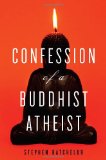 I read Stephen Batchelor‘s Buddhism Without Beliefs (BWB) in the summer of ’09 during my last foray into non-religious Buddhism and it was my favorite of the several Buddhism books I read during that period. The case for reading Confession of a Buddhist Atheist (CBA) was strengthened earlier this summer when I heard Christopher Hitchens mention that he was reading and enjoying the book. Now I’ve read it and enjoyed it too.
I read Stephen Batchelor‘s Buddhism Without Beliefs (BWB) in the summer of ’09 during my last foray into non-religious Buddhism and it was my favorite of the several Buddhism books I read during that period. The case for reading Confession of a Buddhist Atheist (CBA) was strengthened earlier this summer when I heard Christopher Hitchens mention that he was reading and enjoying the book. Now I’ve read it and enjoyed it too.
BWB was a very clear, simple and short explanation of the basic tenets of Buddhism….with no religious additions/overtones/precepts. It was recommended by Susan Blackmore in one of her works on consciousness, and I highly recommend it also. BWB is the kind of book you could read once and go “oh, so that’s what this is all about” or you could decide to read it over and over again, learning/experiencing more each time.
CBA is in some ways a sequel or a companion volume to BWB. Batchelor interweaves his own Buddhist biography, including his early years, with a biography of Siddhattha Gotama (a.k.a. the Buddha). In the biography of Siddhattha Gotama, Batchelor goes to great pains to paint a realistic and accurate picture of the political and sociological pressures that the Buddha faced. It is a very interesting story, much more than just “and then the Buddha became the Buddha and explained Buddhism to the people,” much more. Along the way, Batchelor summarizes the non-religious tenets of Buddhism. Towards the end of CBA, Batchelor explains his research methodology and writing development method. Understanding both of these, eventually, adds to the appreciation of the book.
I enjoyed CBA, but I was predisposed to do so given how much I enjoyed BWB last year. I guess you could read these books in either order. If you’ve read BWB, then you’ll probably like the details (and the personal history of Batchelor) in CBA. On the other hand, if you have less interest in the tenets of Buddhist psychology but are interested in the historical Buddha, you could start with CBA (it stands alone) and then go on to BWB if you’re so inclined.
Also, this book is not a plug for atheism, at all. Batchelor is an atheist. Siddhattha Gotama probably ended up an atheist. But CBA is not about, or even really pro-, atheism. It’s simply a book about the historical Buddha, with an emphasis on defining what Buddhism really was before it turned into a religion (or two…). So, I think CBA would be a mostly non-offensive book for a religious person (with the possible exception of a tightly-wound, religiously-oriented Buddhist!).

Leave a Reply